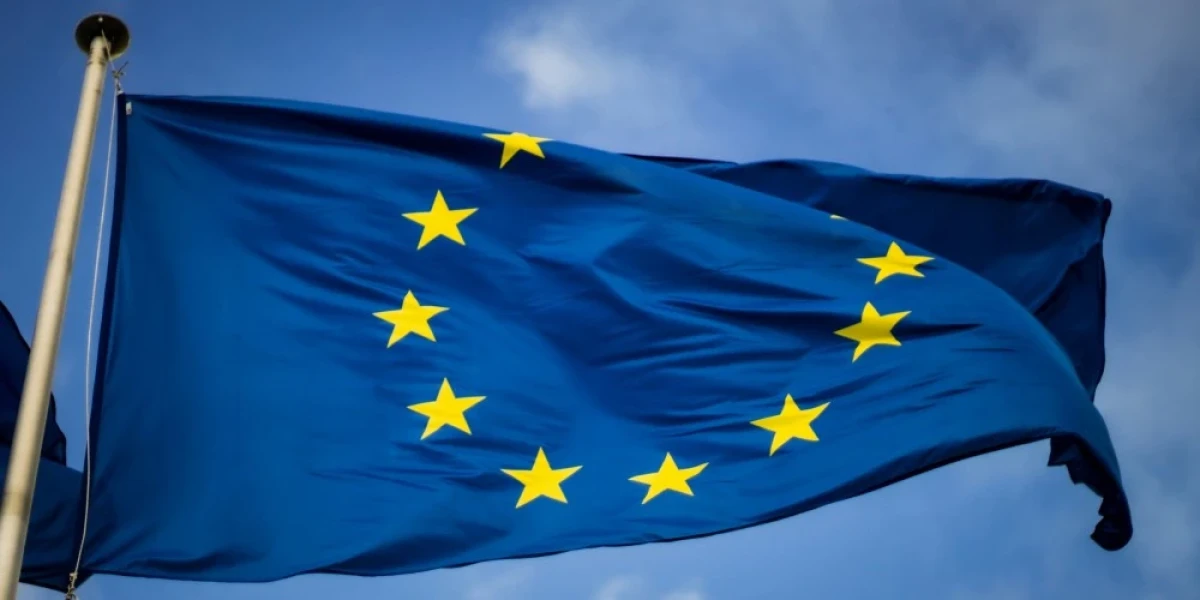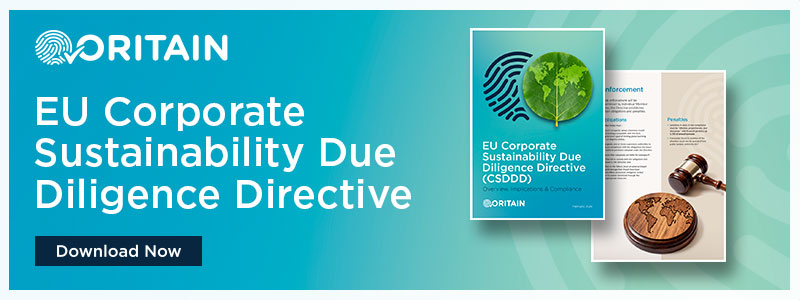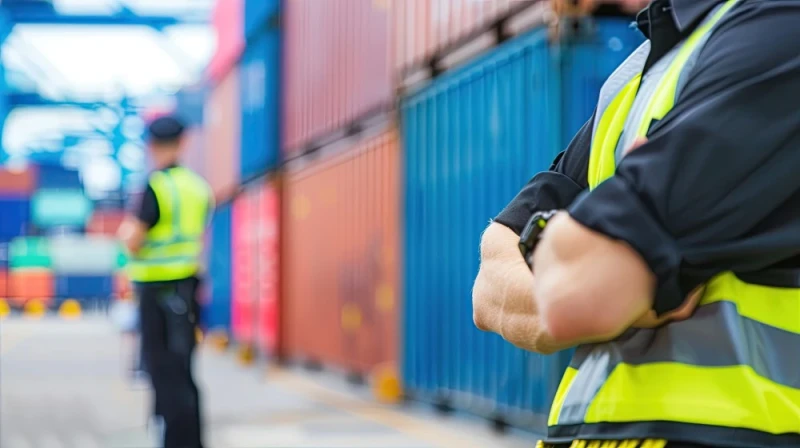EU Corporate Sustainability Due Diligence Directive (CSDDD): Compliance, Risks & What Businesses Must Do
By Michela Mossali | 22 April 2024
minutes to read.

Businesses in the EU will soon need greater oversight of their environmental and social impacts with the approval of the Corporate Sustainability Due Diligence Directive (CSDDD).
The Directive was proposed by the EU Council and Parliament to foster sustainable and responsible corporate behaviour. It sets out measures by which human rights and environmental considerations should be embedded into responsible corporate governance.
The new rules mean businesses must address the broader impacts of their operations – including those of supply chains partners. With penalties incurred by those businesses failing to comply, there’s now a tangible and imminent cost to not conducting business responsibly.
Contents:
- What is the Corporate Sustainability Due Diligence Directive?
- CSDDD compliance requirements and business implications
- CSDDD timeline: latest updates and next steps
- CSDDD and its relationship to other EU & global legislation
- Traceability and transparency: proving compliance with the CSDDD
1. What is the Corporate Sustainability Due Diligence Directive?
The EU Corporate Sustainability Due Diligence Directive (CSDDD) is a regulation requiring companies which conduct business in Europe to identify and mitigate adverse environmental and social effects. These could stem from their own operations, those of their subsidiaries, or from established relationships with supply chain partners.
To achieve this, companies must carry out periodic assessments of processes, policies, and procedures throughout the company’s value chains, with a specific focus on any negative practices concerning human rights or environmental abuses.
The Directive is a response to the difficulty of progressing sustainability and social goals when global supply chains are complex and national rules are fragmented and uneven. This single, unified regulation, applied consistently, is intended to help businesses take up and maintain good practices.
The CSDDD benefits both citizens and companies:
- Citizens enjoy a healthier environment for present and future generations, increased trust in businesses, and more transparency over their purchasing choices.
- Companies have greater awareness of their negative environmental and human rights impacts, and better risk management capabilities.
2. CSDDD compliance requirements and business implications
The Corporate Sustainability Due Diligence Directive applies to EU companies with 1,000 or more employees and EUR 450 million turnover worldwide. It’s expected this will encompass between 5,000 - 5,500 companies.
Non-EU companies are also covered by the Directive if they generate EUR 450 million turnover inside the EU.
Companies affected must integrate due diligence into all their corporate policies. They must have a due diligence policy in place and update this policy annually. This requirement extends to companies’ upstream and downstream activities across their value chains.
The specific sustainability and ESG compliance requirements have been vigorously debated, and critics of the regulation argue that too many businesses are now excluded, effectively watering down the effectiveness of the directive.
Penalties for noncompliance
Any companies which fail to comply with their obligations under the Directive, and which result in adverse impacts that could have been prevented, will be liable for damages.
Enforcement of the CSDDD will be determined by individual Member States, however the Directive stipulates sanctions for cases of non-compliance, including financial penalties based on annual turnover.
The regulation also provides for civil liability, where Member States are charged to ensure that victims receive compensation for damages resulting from the non-compliance.
In addition, the media exposure businesses will face if found to contravene the regulation are likely to have a significant negative impact on consumer sentiment.
Five steps to comply with the CSDDD
Following the steps below will put businesses in a strong position to comply with the requirements.
- Establish due diligence policies and governance: Integrate due diligence into your corporate policies, risk management systems, and supplier codes of conduct.
- Map your activities: Conduct a thorough supply chain assessment to identify and map out all of your operations, subsidiaries, and business partners, both upstream and downstream.
- Identify and prioritize risks: Identify and assess potential adverse human rights and environmental impacts, then prioritize these according to severity and likelihood.
- Mitigate adverse impacts: Take appropriate measures to manage potential impacts, including implementing preventative action plans.
- Fulfill reporting obligations: Communicate your due diligence activities and periodically assess the effectiveness of the measures you've implemented.
3. CSDDD timeline: latest updates and next steps
The Corporate Sustainability Due Diligence Directive was approved by the EU Parliament on April 24, after which it will go for final approval by the EU Council to then be published in the Official Journal of the EU and enter into force. Once adopted, this will create a legal obligation for companies relating to environmental and human rights due diligence within their supply chain.
In order to secure agreement from EU Member States, the Directive underwent significant changes from what was initially proposed. It will also be phased in over a longer period, ranging from 3 years for companies with 5,000 employees and EUR 1,500 million turnover to 5 years for companies with 1,000 employees and EUR 450 million turnover.
It’s estimated that these changes will reduce the number of affected companies by 30% from the initial proposal, equating to around .05% of the total number of businesses operating in the EU.
In addition, the phase-in of companies that fall outside the scope of the Directive but operate in high-risk sectors has been removed.

4. CSDDD and its relationship to other EU & global legislation
The expected adoption of the CSDDD reflects a heightened emphasis around issues of sustainability and the environment. A growing awareness of the role businesses play in enabling a healthy, fair society has led to a series of regulations introduced across the world.
In the European Union, the CSDDD complements the recently updated EU Directive on product labelling and sustainability, which addresses the use of misleading environmental claims and ‘greenwashing’.
The CSDDD also supports the drive for eco-friendly products and brands, covered in the EU by regulations such as the Green Claims Directive and the Ecodesign for Sustainable Products Regulation, currently under review.
The directive aligns with broader ESG reporting and disclosure frameworks. For companies that fall under the scope of the Corporate Sustainability Reporting Directive (CSRD), the reporting required under the CSDDD will be integrated into annual sustainability reports.
The CSDDD shares some common objectives with the New York Fashion Act in the United States. This legislation, proposed in 2022 and currently under consideration in the New York legislature, requires fashion retail sellers and manufacturers to disclose their environmental and social due diligence policies and the impacts of their supply chains.

5. Traceability and transparency: proving compliance with the CSDDD
When the CSDDD enters into law, businesses will need to prove their sustainability credentials. They must have oversight of their entire operations, and those of their supply chain partners, to identify and manage any potential negative impact on the environment or human rights.
Simply put, ignorance is no defence, and verbal assurances won’t achieve compliance. Product traceability programs will be essential to provide the level of oversight and visibility businesses require.
Oritain’s forensic scientific analysis, can audit products at multiple stages of manufacture and sale, to ensure they aren’t associated with practices such as deforestation or forced labour. This testing helps businesses prove the legitimacy of their supply chains and the integrity of their products.
Science provides a reliable, trusted tool for forensic compliance verification, underpinning both the CSDDD and other such global regulations.
To learn more about how Oritain helps organizations prove product origin and improve their sustainability performance, contact us to speak with one of our team.
Disclaimer: The information provided in this document does not and is not intended to constitute legal advice. Instead, all information presented here is for general informational purposes only. Counsel should be consulted with respect to any particular legal situation.





